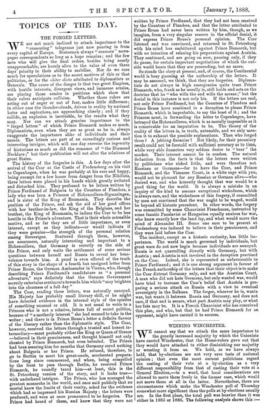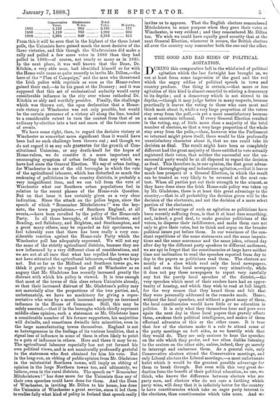WINNING WINCHESTER.
WE cannot say that we attach the same importance to the greatly increased majority by which the Unionists have carried Winchester, that the Home-rulers gave out that they would have attached to either diminishing our majority or wresting it from us. We hold, as we have always held, that by-elections are not very sure tests of national opinion ; that even the most earnest politicians regard the casting of their vote at a by-election as a very different responsibility from that of casting their vote at a General Election,—in a word, that local considerations are allowed to move them freely in the former case, which would not more them at all in the latter. Nevertheless, there are circumstances which make the Winchester poll of Thursday somewhat more significant than the polls at by-elections usually are. In the first place, the total poll was heavier than it was either in 1885 or 1886. The following analysis shows this :— Conservative Votes.
Gladstonian Votes. Total Votes. Msjority.
1885 1,153 982 2,135 171 1886 1,119 783 1,902 336 1888 1,364 849 2,213 515
From this it will be seen that in the highest of the three latest polls, the Unionists have gained much the most decisive of the three victories, and this though the Gladstonians did make a tally and polled a few more votes in 1888 than they had polled in 1886—of course, not nearly so many as in 1885. In the next place, it was well known that the Dean, Dr. Kitchin, a very able man, had identified himself so far with the Home-rule cause as quite recently to invite Mr. Dillon,—the hero of the "Plan of Campaign," and the man who threatened the Irish police with reprisals as soon as the Home-rulers gained their end,—to be his guest at the Deanery ; and it was supposed that this act of ecclesiastical audacity would carry considerable influence in the city over whose cathedral Dr. Kitchin so ably and worthily presides. Finally, the challenge which was thrown out, the open declaration that a Home- rule victory at Winchester was not only possible, but would be the certain precursor of a victory all along the line, tended to a considerable extent to turn the contest from that of an ordinary by-election into a test and omen of the future course of events.
We have some right, then, to regard the decisive victory at Winchester as somewhat more significant than it would have been had no such challenge been thrown out ; and though we do not regard it as any safe guarantee for the growth of Con- stitutional Unionism, or any death-knell for the hopes of Home-rulers, we do consider it a more important and encouraging symptom of urban feeling than any which we have had since the General Election. We say of urban feeling, for Winchester is one of the old boroughs in which the vote of the agricultural labourer, which has disturbed so much the reckoning of politicians in the country districts, is probably a very insignificant item, and we can tell from the vote of Winchester what our Southern urban populations feel in relation to the recent phases of the Home-rule Question. But on that issue it has certainly given us a very clear indication. Since the attack on the police began, since the speech of which " Remember Mitchelstown !" was the key- note, the town populations,—of Southern England, at all events,—have been revolted by the policy of the Home-rule Party. In all those boroughs, of which Winchester, and Reading, and Salisbury, and Brighton, and Southampton, and a great many others, may be regarded as fair specimens, we feel tolerably sure that there has been really a very con- siderable reaction against the Home-rule Party which the Winchester poll has adequately expressed. We will not say the same of the strictly agricultural districts, because they are now influenced by a very different class of considerations, and we are not at all sure that what has repelled the towns may not have attracted the agricultural labourers,—though we hope not. But BO far as the Midland and Southern towns go, we think it pretty safe to regard the poll at Winchester as an augury that Mr. Gladstone has recently increased greatly the distrust with which his policy is viewed. It is true enough that most of the towns of this class return Unionists already, so that their increased distrust of Mr. Gladstone's policy may not materially alter the proportions of the two parties, and, unfortunately, we have no machinery for giving a repre- sentative who wins by a much increased majority an increased influence in the House of Commons. Still, this may be safely asserted,—that if in the boroughs which chiefly represent middle-class opinion, such a statesman as Mr. Gladstone loses
a considerable number of his former supporters, his majorities will dwindle, and sometimes dwindle into minorities, even in the large manufacturing towns themselves. England is not so heterogeneous in the feelings of its various localities, that a signal loss of influence in some of them is often likely to point to a gain of influence in others. Here and there it may be so. The agricultural labourer especially has not yet formed his own political views, and is not unnaturally profoundly grateful to the statesman who first obtained for him his vote. But in the long-run, an ebbing of public opinion from Mr. Gladstone in the substantial Southern towns, will imply an ebbing of opinion in the large Northern towns too, and ultimately, we believe, even in the rural districts. The speech on" Remember Mitchelstown ! " has done more for the Unionists than any of their own speeches could have done for them. And the Dean of Winchester, in inviting Mr. Dillon to his house, has done the Unionists of Winchester a great service, since it led them to realiee fully what kind of policy in Ireland that speech really
invitee us to approve. That the English eleCtors remembered Mitchelstown to some purpose when they gave their votes at Winchester, is very evident ; and they remembered Mr. Dillon too. We wish we could have equally good security that at the next General Election, whenever it occurs, the British electors all over the country may remember both the one and the other.























































 Previous page
Previous page